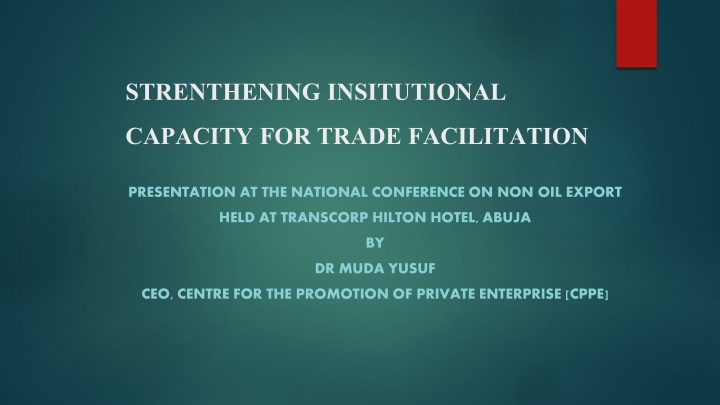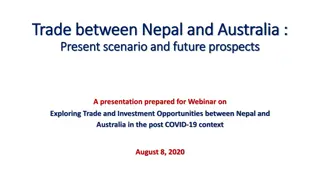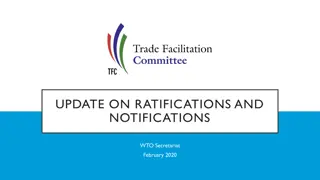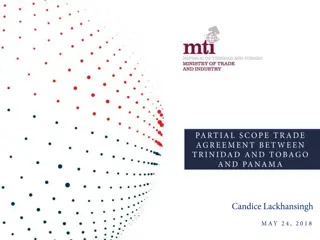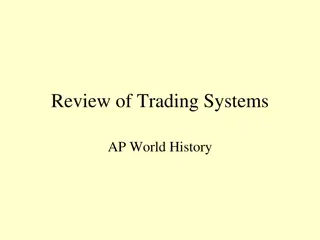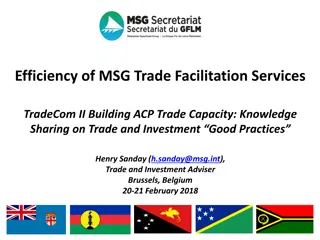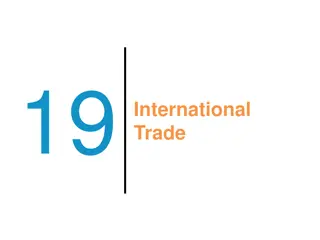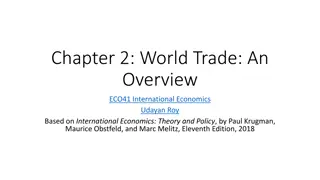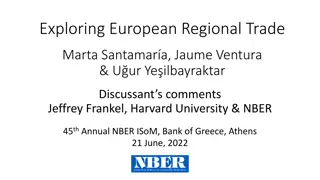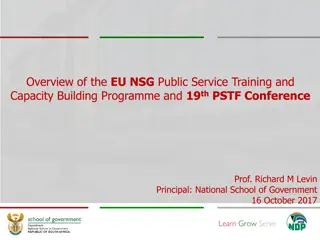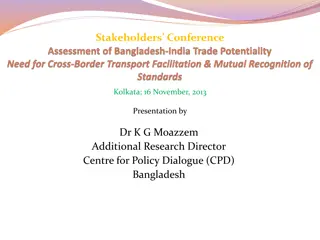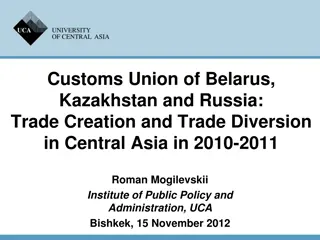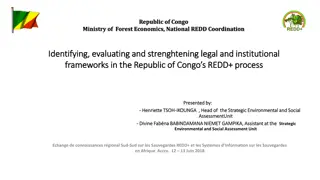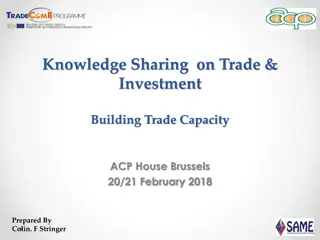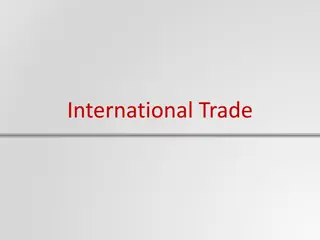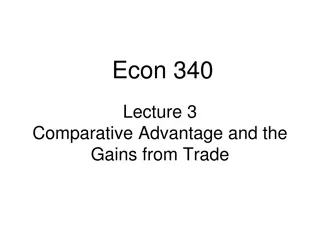Strengthening Institutional Capacity for Trade Facilitation Presentation
Dr. Muda Yusuf presented on the concept and scope of trade facilitation at the National Conference on Non-Oil Export in Abuja. The presentation covered components, institutional issues, forex policy impact, and reform imperatives related to trade facilitation. Trade facilitation aims to simplify procedures and controls for the movement of goods across borders to reduce costs and enhance efficiency while upholding regulatory objectives.
Download Presentation

Please find below an Image/Link to download the presentation.
The content on the website is provided AS IS for your information and personal use only. It may not be sold, licensed, or shared on other websites without obtaining consent from the author.If you encounter any issues during the download, it is possible that the publisher has removed the file from their server.
You are allowed to download the files provided on this website for personal or commercial use, subject to the condition that they are used lawfully. All files are the property of their respective owners.
The content on the website is provided AS IS for your information and personal use only. It may not be sold, licensed, or shared on other websites without obtaining consent from the author.
E N D
Presentation Transcript
STRENTHENING INSITUTIONAL CAPACITY FOR TRADE FACILITATION PRESENTATION AT THE NATIONAL CONFERENCE ON NON OIL EXPORT HELD AT TRANSCORP HILTON HOTEL, ABUJA BY DR MUDA YUSUF CEO, CENTRE FOR THE PROMOTION OF PRIVATE ENTERPRISE [CPPE]
OUTLINE OF PRESENTATION Concept and Scope of Trade Facilitation Components of Trade Facilitation Institutional Issues in Trade Facilitation Forex Policy Impact on Trade Facilitation Reform Imperatives
CONCEPT OF TRADE FACILITATION Trade facilitation looks at how procedures and controls governing the movement of goods across national borders can be improved to reduce associated cost burdens and maximise efficiency while safeguarding legitimate regulatory objectives. The main objective of trade facilitation is to reduce the complexities and costs associated with cumbersome border procedures and controls, while maintaining efficient compliance controls. Trade facilitation is the simplification and harmonisation of international trade procedures ,
TRADE FACILITATION CONCEPT AND SCOPE In its narrowest sense, trade facilitation refers to the reduction of the trade costs associated with moving goods across borders. A broader interpretation encompasses all Non-Tariff Barriers [NTBs] to trade, including behind the border costs associated with the institutional and business environment, services in support of trade, and physical infrastructure in transport, energy and ICT.
TRADE FACILITATION CONCEPT AND SCOPE More recent definitions have been broadened to include the environment in which trade transactions take place, that is, the transparency and professionalism of customs and regulatory environments. It also entails the harmonization of standards and conformity to international or regional regulations.
TRADE FACILITATION CONCEPT AND SCOPE Trade facilitation according to the WTO refers to the avoidance of unnecessary trade restrictiveness. To achieve this, economies are applying modern techniques, standards and technologies, while at the same time improving the quality of control in an international harmonized manner
TRADE FACILITATION AGREEMENT It is the first multinational Trade Agreement to be concluded since WTO was formed 20years ago. Trade facilitation came into force on 22ndFebruary, 2017 when WTO obtained acceptance of the agreement from 2/3 of its 164 members. 153 members [including Nigeria] have ratified the trade facilitation Agreement. Nigeria ratified on 16thJanuary, 2017. About 32 African Countries have ratified the agreement.
OBJECTIVES OF THE TRADE FACILITATION AGREEMENT It has the following objectives: Ease the flow of goods across borders It will reduce trade cost by more than 14% in low income countries and 13% in upper-middle income countries. Export requires 2-11 documents and could take between 6-86 days; import requires 2-17 documents and could take between 4-130 days.
KEY COMPONENTS OF TRADE FACILITATION PROCESS OPTIMISATION COST REDUCTION TRANSPARENCY INTER-AGENCY COOPERATION ENHANCEMENT DIGITIZATION FACILITIES AND INFRASTRUCTUREE QUALITY OF INSITUTIONS
Prearrival Processing: ability to lodge, submit, register or check the goods declaration and supporting documents before the arrival of the consignment. Fast tracking should work 24/7 at all customs locations and away from customs offices. The Trade facilitation agreement requires WTO members to establish such special infrastructure facility. PROCESS OPTIMISATION Release upon Arrival: Customs can release goods prior to submission of goods declaration provided that the declaration will subsequently accomplish all formalities. Prioritization: Customs and border agencies must give priority to clearance of relief materials, export, transit cargo etc.
RELAXING PROCEDURES There may be need to drop some requirement to expedite speedy clearance of cargo. Simplification of Goods Declaration Minimizing requirement: for example, reducing documentation requirement to speed up release of expedited shipments. Flexibilities regarding inspection with better use of discretion and removing rigidities in the inspection. Acceptance of copies; paper or electronic copies of required documentation. There may be request for signal documents if there is need to do so. Risk Management: low risk consignment should be cleared expeditiously while high risk cargoes may attract a more rigorous scrutiny.
TRANSIT MEASURES As much as possible, avoid loading and unloading at the borders. Need to speed up clearance of transit cargoes Create green lanes to allow fast transport of essential goods. Adopt paperless solutions.
Provision of adequate information on all imports and trade processes online to remove any form of uncertainty. TRANSPARENCY AND INTER AGENCY CO- OPERATION Strengthening co-operation among agencies and promoting harmonization in inspections. Discontinue the silos mentality of government agencies.
TECHNOLOGY ADOPTION Reduction of direct contact among people. Improves Efficiency of trade processes. Deployment of single window for all agencies. Eases cargo examination.
UNCTAD SUPPORT FOR TRADE FACILITATION UNCTAD offers technical assistance in the following areas: General Trade Facilitation Assistance Support for National Trade Facilitation Committee ASYCUDA Programs Port Management Programs Transit and Corridor Solutions Non- tariff Measures Program
POLICY ANGLE TO TRADE FACILITATION [FOREX MANAGEMENT] Foreign Exchange Policy is critical to Trade facilitation. This is a Nigerian peculiarity which we need to acknowledge. NXP Challenges and Forex Policy Liquidity Challenges in the Forex Market Forex Rationing Transparency issues in allocation Forex Exclusion list
Trade Facilitation[Infrastructure Issues] Lack of Scanners Physical Examination of Cargo Adequacy of Cargo Handling Equipment Frequent Breakdowns of servers Access Roads to the Ports Quality of ICT facilities
INSTITUTIONAL ISSUES IN TRADE FACILITATION MULTIPLICITY OF AGENCIES AT THE PORTS TOO MANY DISCRETIONARY POWERS EXCESSIVE FOCUS ON REVENUE GENERATION AS KPI CORRUPTION CAPACITY ISSUES, ESPECIALLY IN THE TECH SPACE DISPUTE RESOLUTION CHALLENGES, ESPECIALLY WITH CUSTOMS.
REFORM IMPERATIVES [DISPUTE RESOLUTION MECHANISM] Creation of credible dispute resolution framework to resolve disputes between the following: The Nigeria Customs Service and the Exporters The Terminal Operators and the Exporters The shipping Companies and the Exporters
REFORM IMPERATIVES [TECHNOLOGY ADOPTON] Technology driven cargo clearance processes Complete Single Window Elimination of Human Interface Use of Scanners Discontinue physical Examination of Cargo Strengthen Institutional ICT Capacity of Customs or Outsource
Reform imperatives [Prioritizing Exports] Shipping companies should accord better priority to Exports Terminal Operators should give better priority to Exports. Export Terminals should be created at all ports. Fast track channel to the ports for exports
REFORM IMPERATIVES [STREAMLINING PROCESSES] Rationalization of Agencies involved in cargo clearance process Reduction in documentation Audit of Documents to determine relevance
REFORM IMPERATIVES [TARIFF & TRADE POLICY REVIEW] Tariff Reform Tariff rates need to be reviewed. Tariff Regime generally too high.
REFORM IMPERATIVES [DISCRETIONARY POWERS] Elimination of discretionary powers by officials of Customs Respect for processes and the need for SOPs Respect for hierarchy in the Customs Cargo clearing process
REFORM IMPERATIVES [POLICY ALIGNMENT] Need for Alignment between Forex Policy and Trade Policy Need for Consultation with relevant Ministries, NEPC Industry ,Trade and Investment, Finance, NIPC Need for proper impact Analysis of Forex Policy on Trade
REFORM IMPERATIVES [TRADE INFRASTRUCTURE] Infrastructure issues for better Trade Facilitation Access Roads to the Ports Rail link to the Ports Rail link needed for dry Ports Adequacy of Ports Infrastructure Graft quality the Ports etc.
REFORM IMPERATIVES [TRADE FACILITATION AS CUSTOMS KPI] Need to Prioritize the Trade Facilitation Role of the Nigeria Customs Service Currently relegated with focus on revenue generation role The Customs KPI Should reflect this
